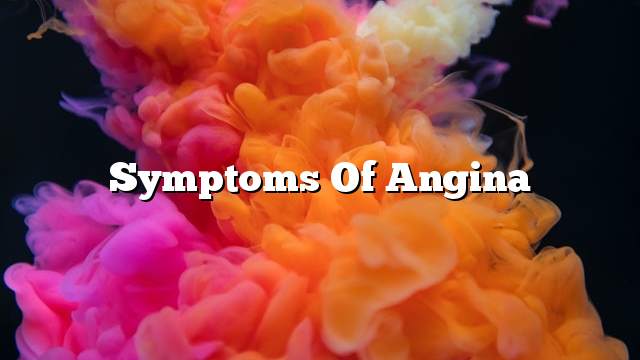heart attack
Angina Pectoris is used to express temporary chest pain caused by myocardial ischemia, and ischemia occurs because the heart muscle is not supplied with sufficient blood and oxygen to function; Blood and the necessary oxygen through the coronary arteries, and as in the rest of the body, the heart is balanced with the need, and therefore produce a case of heart ischemia when low blood flow in the coronary arteries, or when the increase of the need of the heart to blood and oxygen, (Atherosclerosi s) is the most common cause of angina, a condition characterized by inflammation and inflammation in the cells of the arteries, in addition to the accumulation of fat, cholesterol, calcium, and cellular waste in the walls, so patients with severe atherosclerosis in the coronary arteries by 50% may suffer And thus angina pectoris when they exert effort or exposure to pressures that increase the need for the heart to blood, and those who suffer from stiffness of 90% may suffer from myocardial infarction and thus angina pectoris even during rest.
Symptoms of angina
Angina is a symptom in itself, or a combination of symptoms, not a disease. It is necessary to take complete information about the patient, such as the frequency of angina, the severity of the angina, and other information that can be distinguished from heart attack (Myocardial Infarction, as pain does not disappear in heart attacks, while only a few minutes in the case of angina, the most prominent symptoms that appear on the patient when suffering from angina:
- Feeling uncomfortable in the chest behind the shear bone: This may be the feeling of pressure, the age, the burning, the suffocation, or the heaviness in this area.
- Feeling pain is concentrated in the head of the stomach, back, or jaws, neck, or shoulders.
- Pain as a result of physical exertion, after eating, exposure to cold, or emotional trauma.
- The pain lasts for about 15 minutes, disappears by taking rest or taking nitroglycerin.
- Pain is not affected by breathing, coughing, or by changing the body’s position.
- Breathlessness, and sometimes dizziness. The patient may also faint. He may suffer from anxiety, nervousness, severe sweating, skin pallor, nausea, and occasional heartbeat.
Factors that increase the chance of angina
The risk of coronary angina increases when there are factors that can cause coronary stenosis, including:
- Hypertension: Blood pressure is normal if reading the pressure device 120/80 mm Hg, and when high blood pressure from this value, this stress on the various organs of the body, including the heart and arterial walls, as the arteries Designed to pump natural pressure, when pressure rises from its normal value, the arteries have trouble pumping blood, which causes damage.
- Eat plenty of high-fat and cholesterol-rich foods: Most of the cholesterol the body needs is made in the liver, but eating high-saturated foods increases the level of harmful fats in the body. Cholesterol has two main types: low density lipoprotein ), The harmful type of cholesterol that causes blockage of the arteries, and high density lipoprotein (a protein that is useful).
- Diabetes sufferers: People with uncontrolled diabetes are at risk of angina, because excess blood sugar can damage the walls of the arteries.
- NEW YORK (Reuters Health) – The chance of narrowing arteries increases as age increases, so older people are more likely to be victims of heart attacks.
- There is a family history of angina or heart disease.
- Insufficient exercise.
- Smoking.
Treatment of angina pectoris
The treatment of angina pectoris to alleviate the symptoms of the patient, and reduce the possibility of future heart attacks, and there are many methods used in the treatment of angina, including:
- Lifestyle changes: The patient should stop smoking and lose weight if he is obese. It is advised to avoid eating large meals, and to reduce the intake of foods high in saturated fats, and it is worth noting the need for diabetics to adhere to the appropriate diet and exercise regularly.
- Taking medications: The most important medicines used in the treatment of angina include:
- Nitrates: which expand blood vessels, thus improving blood flow.
- Aspirin: which prevents the formation of blood clots, which facilitates the passage of blood in the narrow arteries.
- Anticoagulants such as Clopidogrel and Prasugrel (Prasugrel).
- Beta blockers: which reduce the heart rate and effort of the heart muscle, and thus reduce blood pressure, and works to expand the arteries.
- Statins: which reduce the level of cholesterol in the blood.
- Calcium channel blockers: These drugs expand the arteries.
- Medical and surgical procedures, most notably angioplasty and stenting, as well as coronary artery bypass surgery (Coronary artery bypass surgery).
